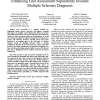Free Online Productivity Tools
i2Speak
i2Symbol
i2OCR
iTex2Img
iWeb2Print
iWeb2Shot
i2Type
iPdf2Split
iPdf2Merge
i2Bopomofo
i2Arabic
i2Style
i2Image
i2PDF
iLatex2Rtf
Sci2ools
180
Voted
BSN
2015
IEEE
2015
IEEE
Causal analysis of inertial body sensors for enhancing gait assessment separability towards multiple sclerosis diagnosis
—Gait assessment is a common method for diagnosing various diseases, disorders, and injuries, studying their impact on mobility, and evaluating the efficacy of various therapeutic interventions. The recent emergence of inertial body sensors for gait assessment addresses the limitations of visual observation and subjective clinical evaluation by providing more precise and objective measures. Inertial sensors have been included in an ongoing study at the University of Virginia Medical Center on Multiple Sclerosis (MS), a chronic autoimmune disorder of the central nervous system (CNS) that produces neurologic impairment and functional disability over time, with the goal of improving the ability to assess MS-affected gait and to distinguish between subjects with MS and those without MS. This work presents a gait assessment technique based on causal modeling to distinguish MS-affected gait and healthy gait. The approach in this work is based on the hypothesis that the strength of interact...
| Added | 17 Apr 2016 |
| Updated | 17 Apr 2016 |
| Type | Journal |
| Year | 2015 |
| Where | BSN |
| Authors | Jiaqi Gong, John Lach, Yanjun Qi, Myla D. Goldman |
Comments (0)

